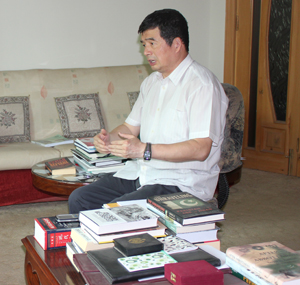Written by: Salma Chaudhry - Posted on: July 31, 2013 |  Comments | 中国 (Chinese)
Comments | 中国 (Chinese)
Google Translation: اُردو | 中文
Professor Zhou Rong came to Pakistan on October 21st 2003. “Nine years, eight months and ten days ago, to be precise,” he gives the exact dates. It is interesting to note that where many Pakistanis are not well versed with their own culture and find themselves in a quandary when asked questions, a Chinese Professor who has been here for only a few years, astonishes us with his remarkable understanding of the country. From art to politics, languages to professions, rituals to prayers, religions to traditions and various ethnic groups of Pakistan, he is well-acquainted with almost everything.
He started his career in Pakistan as a visiting faculty member at various universities, including Peshawar University, Sindh University, Shah University in Sukkur and NUML in Islamabad. His early years were dedicated to teaching and journalism. “As a journalist, I have travelled a great deal and worked during my travels. I went to the battlefield of South Waziristan, Bajaur, Buner, Malakand, Shangr and even Quetta to interview Pakistani and Afghan Taliban.” Professor Zhou is of the view that in order to get a better depiction of a culture and people, you have to submerge yourself in their society, “like I have, so you understand the people and can form your opinion without any prejudice,” he says. In the beginning, his work revolved largely around translating news from Pakistani and International papers available locally, summarizing them and then sending them over to Beijing. “My articles at that time were mere translations, and I had a limited understanding of the Pakistani society,” he confesses candidly.
 |
Since then, he has travelled through most of Pakistan, gotten to know its provinces, its cities, its distant countryside, and even parts of the north and Balochistan, the latter two being regions not traditionally frequented by foreigners. He came to comprehend that Pakistan is a complex society with multiple ethnic groups. “I’ve learned to trust my own knowledge and experience when I talk about Pakistan.” His understanding of the various ethnic and sectarian groups in Pakistan is impeccable and he believes that Pakistani society is evolving, but he believes that the more things change, the more they stay the same. “So, in Pakistan we can have evolution but not a revolution.” In his opinion, Pakistanis are now curious and fervent to transform their country through education and development. “Today’s Pakistan is undeniably different from the one during my early years in the country,” he recalls, “In the beginning, people didn’t care about their problems, be it poverty, the shortage of electricity or any other issue facing the common man, But now, they have awakened and are striving to secure their everyday life which is more vital than any political problem.”
We ask him about the decision to come here and his experiences so far. “My exposure to Pakistan was limited in the beginning, as I said earlier. I classified it as one of the close neighbours of China but didn’t know much about the country itself.” But soon, he says, he began to realize that it was an affectionate and spectacularly hospitable country, a side which is barely acknowledged in the West. “It is an amazing country for pursuing research; you cannot comprehend South Asia and the Islamic world without understanding the multifaceted Pakistani society.” He says he feels that Pakistan is full of love, harmony, warmth and allure, and though it has been deprived of all this in return by other countries, its relationship with China is based on reciprocity and brotherhood. “We are comfortable living in Pakistan because the Pakistani people love and respect us and, we realize that we are equal partners.”
During decade of stay in Pakistan, he has met the highest officials, including many Presidents and Heads of State. “I’ve had the privilege of having a one on one meeting with President Musharraf,” he recalls. “I have also met President Leghari and PM Nawaz Sharif on different occasions.”
Winding up our conversation, we ask him about the future of people to people relations between the two countries, and he is emphatic in his answer. “In order to have a better understanding of each other,” he says, “we must pay attention to small things like culture, tradition, and language, to appreciate the other side; you must be able to read them.”